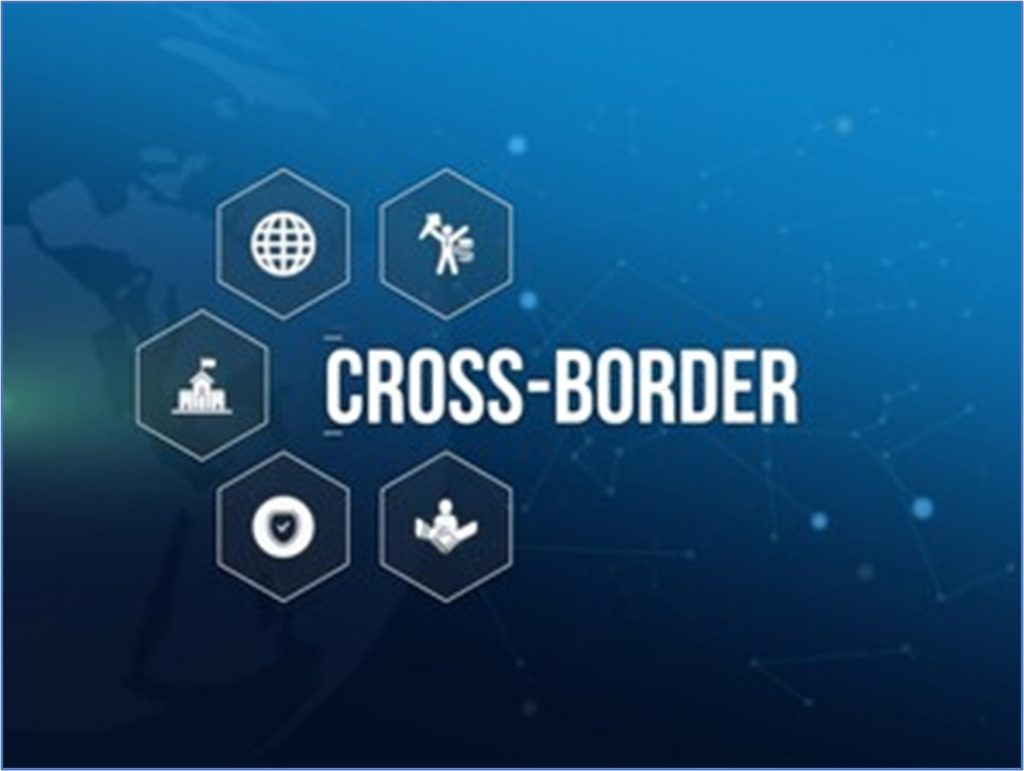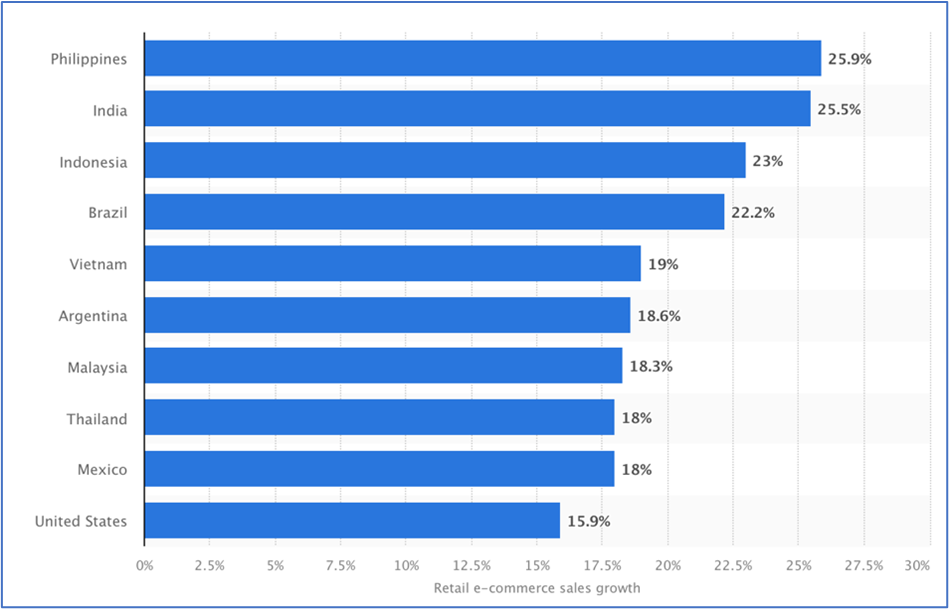
Global e-commerce expansion continues to redefine the shape and complexity of supply chains. It is no secret that the world of e-commerce has been booming for a while. Experts forecast that the world of e-commerce will only continue to grow.
According to Phaneuf, US e-commerce sales are expected to cross 1$ trillion for the first time in 2022. This goal was not expected to be reached before the pandemic until 2024. The cross global growth is forecasted to reach %1.06 trillion in 2022 (Phaneuf, 2022).
See the graph below illustrating the leading countries based on retail e-commerce sales growth in 2022. Even large players such as the US and India eExpect a high growth percentage in 2022 (Statista, 2022).

Figure 1(Leading countries based on retail e-commerce sales growth in 2022 – (Statista, 2022))
Still, there are problems, such as trouble maintaining cross-global compliance with trade regulations and applying data to work more effectively. Let’s take a closer look at cross-border e-commerce challenges and how your network partnerships and improved global compliance rates can help you do more with less.
What is Cross-border E-commerce?
Simply put, cross-border e-commerce is when sales occur and result in transactions across literal country borders.
For instance, a Dutch clothing store that sells and ships their products to foreign Spain (crossing borders) through their online website is conducting cross-border e-commerce. This sale can also be conducted from their computer or mobile device through marketplace platforms such as Amazon or eBay. But, this is where the complexity begins to grow. It’s no longer enough to maintain compliance with regulations in the home country but all countries and all countries during which goods might move across roads or other infrastructure.
How Prevalent Is Cross-border E-commerce Exactly?
Cross-border logistics is growing throughout the e-commerce world in tandem with supply chain resilience, payment flexibility, and generalized market expansion. For instance, Dutch cross-border e-commerce has shown to be increasing significantly with 95% of Dutch consumers shop online nowadays (Emerce, 2022).
The combined sales amount to 14.8billion euros. Dutch e-commerce infrastructure now includes 67.000 online stores alongside a strong, developed logistical network.

Potential risks to look out for
Most business activity comes with risk, including cross-border e-commerce. But cross global compliance risks can be broken into these three categories(Laubscher, 2021):
- Even a small number of disruptions can lead to lasting negative effects. For example, negative customer reviews have strong impacts on customer retention and prospect leads. Meanwhile, delayed orders result in lost profitability . Such issues are especially difficult for starting businesses with limited or relatively unknown brand reputations.
Many e-commerce businesses make the smart decision to outsource their cross-border logistics needs to a fulfillment service provider. Outsourcing reduces risk potential error and allows them to focus on their core business.
- Different, changing regulations are another risk. Proper conduct of cross-border e-commerce means your business must comply with the regulations of all affected countries.
For instance, conducting cross global commerce with many different countries, especially outside of the EU, inherently brings many risks. Changing regulations requires constant, extensive knowledge of what you can and cannot do when selling products. Small mistakes may result in heavily delayed shipments that spiral into accumulating negative effects.
Before any cross-border transaction, know your compliance requirements. Further, scaling businesses often make use of external parties, such as consultancy parties, to ensure global compliance. Others completely outsource fulfillment procedures to cull all risks associated with cross- border logistics.
- Fraudulent behavior is yet another risk. Bots (fake customers created by malware) might place tons of fraudulent orders. Also, use well-established, transparent payment service providers.
Having multiple payment options also increases payment flexibility, and reducing the order threshold, such as minimum for international shipping, is a positive strategy. Inexperienced or limited payment service providers could lead to additional setbacks, and you might need to refund several orders.

Get Expert Help in Cross Global Compliance, Payment and More With ModusLink
Cross-border logistics is essential to the success of all brands and crucial to scaling your e-commerce businesses. Know the risks, stay tuned with industry regulations, and adjust your strategy accordingly. Or, do it all in one move by outsourcing to ModusLink. Talk to a ModusLink Expert today to get started with your own cross global plan and fulfillment strategy.
Bibliography
Cross border e-commerce: Alles over internationaal online ondernemen. (2021, 11 juni). BZTRS. Geraadpleegd op 14 maart 2022, van https://www.bztrs.nl/blog/cross-border-e-commerce-alles-over-internationaal-online-ondernemen/
Day, B. (2019, 3 juli). Cross-border commerce, waar moet je aan denken? Bluebird Day. Geraadpleegd op 13 maart 2022, van https://www.bluebirdday.nl/blog/cross-border-commerce-waar-moet-je-aan-denken
Ecommerce News Nederland. (z.d.). Crossborder ecommerce – Verkopen over de landsgrenzen. Ecommerce News. Geraadpleegd op 11 maart 2022, van https://www.ecommercenews.nl/tag/crossborder/
Emerce. (2022, 24 januari). E-commerce voorbij de landsgrens? Hoe je met cross-border selling begint. Geraadpleegd op 13 maart 2022, van https://www.emerce.nl/achtergrond/e-commerce-voorbij-de-landsgrens-hoe-je-met-cross-border-selling-begint
Keenan, M. (z.d.). Global Ecommerce: Stats and Trends to Watch to Succeed Internationally (2022). Shopify Plus. Geraadpleegd op 12 maart 2022, van https://www.shopify.com/enterprise/global-ecommerce-statistics
Laubscher, H. (2021, 15 september). Why Cross Border Ecommerce is the Future of Ecommerce. Ecommerce Platforms. Geraadpleegd op 14 maart 2022, van https://ecommerce-platforms.com/articles/cross-border-ecommerce-future-ecommerce
Phaneuf, A. (2022, 22 maart). eCommerce B2B Industry Statistics for 2022. Insider Intelligence. Geraadpleegd op 12 maart 2022, van https://www.insiderintelligence.com/insights/ecommerce-industry-statistics/
Statista. (2022, 18 februari). Fastest-growing retail e-commerce countries 2022. Geraadpleegd op 11 maart 2022, van https://www.statista.com/statistics/266064/revenue-growth-in-e-commerce-for-selected-countries/